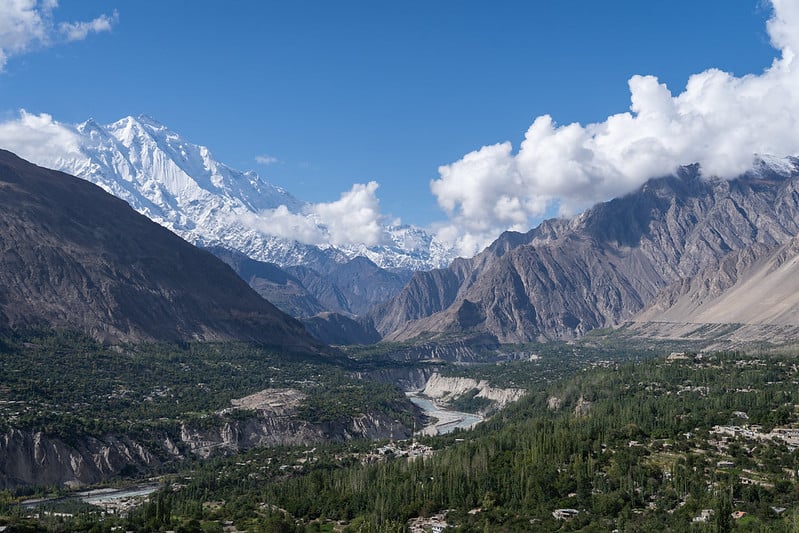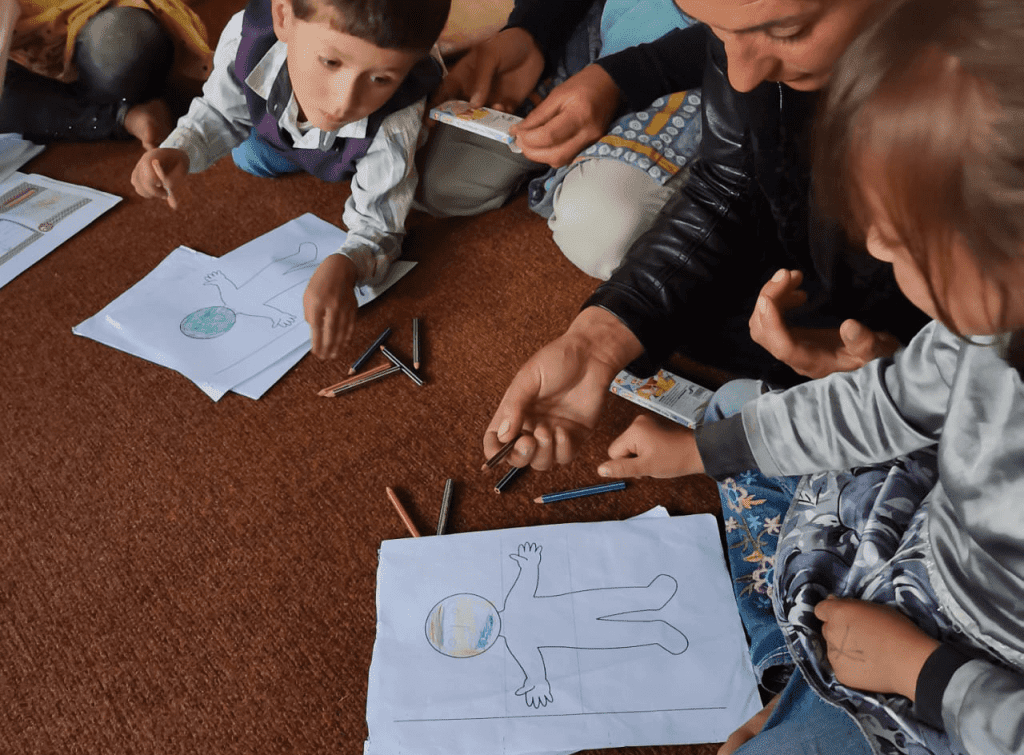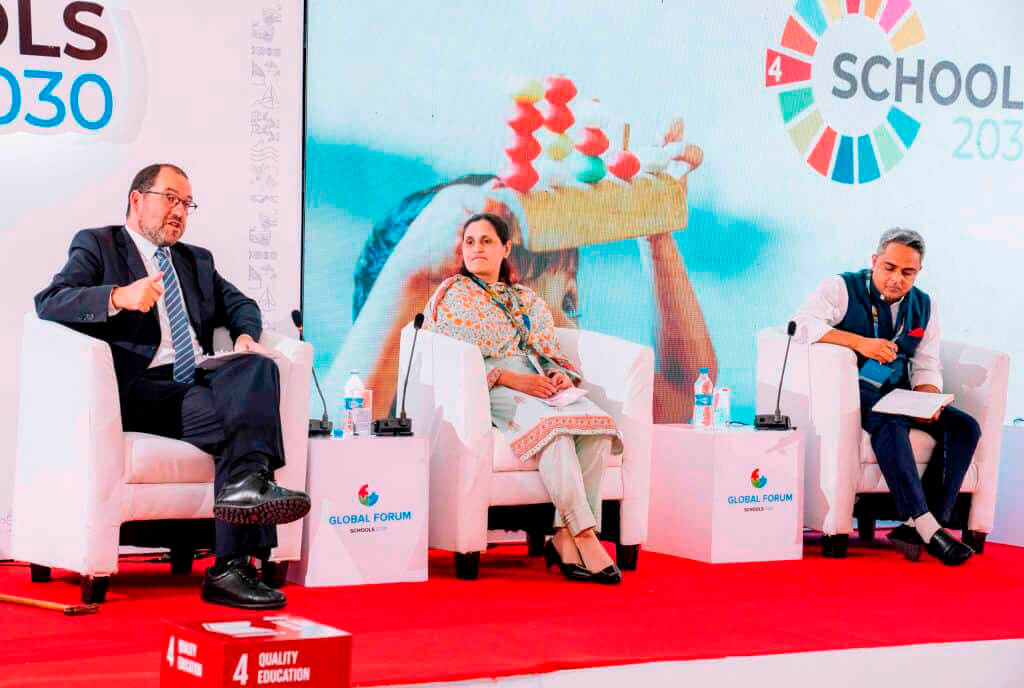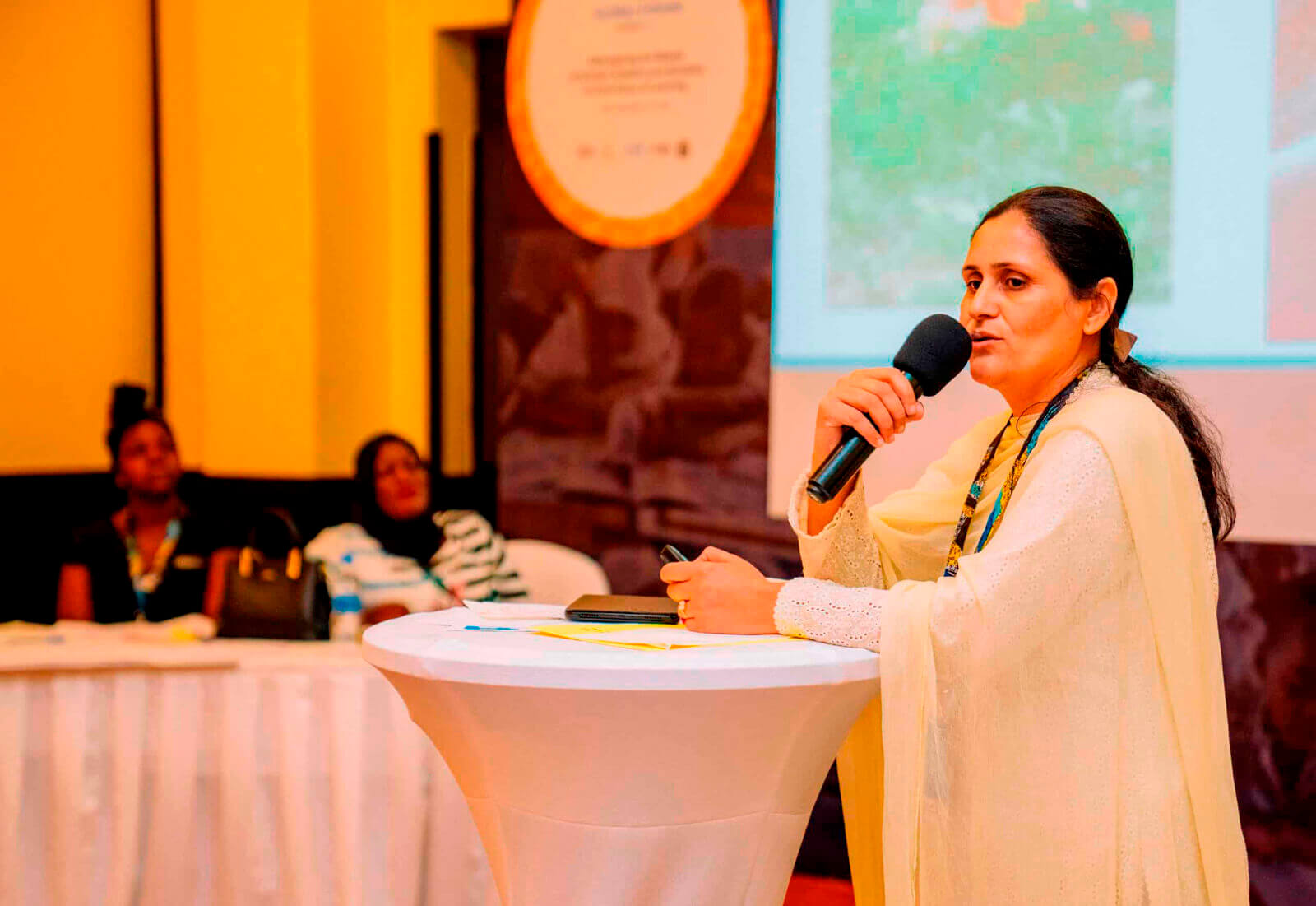“Teaching and learning is my passion because I believe that education is the most effective tool to bring social and economic development to an individual and society.”
In June 2022, Ms. Sajida Baig, headteacher at the Government Boys’ High School in Karimabad, Hunza, Pakistan, travelled over 3000 miles to join other teachers, education experts, civil society representatives and Ministers for Education at the Schools2030 Global Forum in Dar Es Salaam.
The first female principal at her high school in over 110 years, Ms Sajida was invited to share the stage with the Hon. Prof. Joao Costa, Minister for Education in Portugal, and give her perspective on how the global education community can better support classroom assessment. She also presented on the third day of the Forum (image above) alongside teachers from Schools2030’s nine other countries on the Mother-Teacher Guide, developed through Human-Centred Design (HCD), now being used in classrooms across her area to improve parental engagement and support play-based learning.
Read the interview below with Ms Sajida, where she gives her insights on teaching and her students, how she has navigated the HCD process and why she is excited by the opportunities that being part of the Schools2030 initiative brings to her and her school.
Thank you for taking the time to talk to us today Ms Sajida. Please tell us a little about your school and what you enjoy about teaching.
I have been engaged in teaching and learning since 1998. Currently, I am working as a Head Teacher at the Government Boys High School, Karimabad, Hunza, where I have been working since 2000. It is a Public Sector School with 300 students. It was established in 1912 for boys from ECD to Grade 10. The majority of the students belong to a marginalised group in society and the government provides them with free education.
The thing I like most about teaching is my students. I love interacting with them, I love learning from them, and I love helping them to understand the situations of their lives. I love when they see the connection between what they are learning and the world around them. All these things give me the courage to work for them in challenging situations.
In your opinion, what are the biggest challenges to learning your students face?
My students have resilience, patience and humility, but sadly they often lack opportunities and resources like the internet, a variety of books, and other items. Still they do not give up. They have limited facilities at home and they have to help their parents in the fields and do other chores at home. Their economic background creates hurdles in their studies. Most face challenges in learning Urdu and English, which are second and third languages for these children.

You have been instrumental in helping Schools2030 in Pakistan to test the Mother-Teacher Guide. Can you tell us about your experience?
During COVID-19, the students faced many challenges when schools were closed in Gilgit-Baltistan and Chitral. These regions are mountainous, and the rainy season and winter are very harsh. The students live in remote villages where there is limited access to the internet. So during the closures, their learning was severely disrupted. Teachers couldn’t visit all the students at their homes and so there was a need for alternative approaches to help the students keep learning at home.
In response, the Aga Khan Foundation (AKF) Pakistan Education Team in collaboration with Aga Khan University’s Institute for Educational Development developed the Mother-Teacher Guide through Schools2030’s Human-Centred Design (HCD) workshops The guide consists of simple videos and worksheets for mothers to support children’s learning, and offers easy and fun activities for different age groups and literacy levels so that even mothers who are not educated themselves can support children learning. I have found the Mother-Teacher Guide is equally effective now that schools are open, as it enables parents at home to contribute to the holistic development of their children. Learning through play is at the very heart of guide, which I believe is very important for holistic development.
When luckily my school became part of Schools2030, I attended the HCD workshop conducted by AKF staff and during the exploration and assessment phase we discovered problems with literacy development in the early years, and important practices like hygiene, nutrition, and relationship building were often ignored. In search of innovative solutions, I tested different ideas but found the Mother-Teacher Guide to be very effective as it provides a great opportunity to engage parents – particularly mothers – as teachers. I have since adapted the guide.

How has the guide been disseminated into communities? What early signs of impact are you seeing?
We translated these into Urdu and the local language (Burushaski) and I invited mothers from the community to a meeting to distribute the guide amongst them. I conducted meetings and sessions for mothers and fathers with the help of two teachers, one female and one male for support. In the first two meetings, we discussed the outline of the whole project and the process of Mother-Teacher Guide implementation. Only two fathers participated in the meeting, though in the second meeting we were pleased that seven fathers were able to join. Many of the students’ fathers work out of town or are very busy with farming and other jobs so they were not able to visit the school. To fill this gap, one of our teachers visited their homes to discuss the Father’s Orientation Guide (a resource available alongside the Mother-Teacher Guide).
Mother participation was very encouraging. During the meeting the materials (the Mother-Teacher Guide, the Mother’s Orientation Guide and the Father’s Orientation Guide) were distributed with the support of the Schools2030 team. After that mothers were asked to visit the school twice a week for the next month for orientation. It was encouraging to see the mothers become co-teachers in the classroom, even motivating other mothers! We have also expanded some of the activities and, in some cases, asked mothers to sing local songs and poems for their children instead of the poems in the Guide to make it easier and more contextualised.
The impact of the Mother-Teacher Guide has been remarkable. When the sessions were arranged for mothers, they were punctual and active and so keen to learn more to help their children. We have observed that the student’s numeracy and literacy and self-awareness have improved. We are now trying to share the guide with more schools in the area and help facilitate their use and dissemination of the guide.
How does the guide support the children’s improved holistic learning experience, in your view?
It changes the stereotype about learning through play. As in most of the rural Pakistani context, it is predominantly believed that learning can only take place in a structured environment. It is perceived that if children are at play it means no learning is taking place. The Mother-Teacher Guide transformed perceptions that learning can also take place in a playful and fun way. It enables a mother to develop a friendly relationship with her children which is crucially important for students’ emotional and social well-being. Some of the mothers shared that initially, they were concerned about the playful activities of their children. Now they use those playful activities in their learning of literacy, numeracy, and emotional and social wellbeing.
After two months, it was observed that the student’s academic performance such as numeracy, literacy, and self-awareness was improved. When my teachers visited students’ homes, they found a great change in their home environment – many mothers had created a class for their children at their home. The mothers were also more concerned about their food and that they were getting proper nutrition.

Please tell us about your experience with human-centred design. Was there anything that surprised you about the process?
To bring sustainable change, it is essential to find out the root issues and create realistic contextual solutions that meets these issues. In my experience, Schools2030 provides appropriate tools (such as the HCD Toolkit) to achieve these objectives. At first, I found the HCD process very complicated and the solutions would be too difficult to implement in our school. Usually, the solutions that can solve problems quickly are the ones that are high cost and high commitment. But HCD has helped me understand that actually with low cost and low commitment ideas we can achieve better results. Now I am comfortable engaging my students and other stakeholders systematically through HCD to tackle the issues we are facing at school, at home, and in the community.
What are your hopes for the Schools2030 program in the future for your school and education in Pakistan in general?
It was a wonderful experience for me to engage with HCD in my school and to attend the Schools2030 Global Forum. I feel lucky for this experience because the opportunity has developed my confidence and interacting with Global Forum participants allowed us to reflect on our practices and underpin what I have learned about HCD. Now, I feel confident that the programme will help the schools to bring positive change in the teaching and learning process for the holistic development of children.
The Pakistani Public Education System needs a lot of attention and improvement. The majority of the students in the Public Sector are from marginalised groups in society. The schools have limited facilities and resources. Teachers are overburdened due to policies, expectations, resources, and a lack of appropriate skills. As a result, quality education is not an outcome. In this situation, Schools2030 is a ray of hope for us. This programme will develop appropriate skills of stakeholders (policymakers, researchers, principals, teachers, and parents), will engage the students in effective learning activities with appropriate resources, and support the schools technically in targeted tasks given by the Government Department.
In a nutshell, I hope that the students in our schools by 2030 will be in a safe and supportive learning environment with fewer challenges. They will be strong physically, emotionally, mentally, and socially. I am thankful to the Schools 2030 Pakistan team for their support, cooperation, guidance, and care throughout the process.
We are grateful to you too, Ms Sajida.
